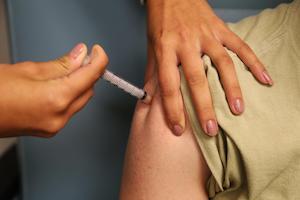What is SIRVA?

Shoulder Injury Related to Vaccine Administration (SIRVA) is one possible adverse event that might follow any vaccination administered into the shoulder. Unlike other adverse reactions to vaccines, SIRVA is specifically a reaction to the administration of the vaccine, rather than a reaction to the vaccine’s constituents. Shoulder injuries can be linked to any vaccine on the vaccine injury table, including the COVID-19 vaccine, which is currently covered under the CICP.
SIRVA occurs when any vaccine is improperly injected into the deltoid muscles of the shoulder and injures either the shoulder joint or the fluid-filled bursa beneath the muscle. Many instances of SIRVA are directly attributable to injections received at a pharmacy rather than at a physician’s office; with less training than doctors and qualified nurses, pharmacy staff are more likely to improperly administer a vaccine and cause injury.
SIRVA is an umbrella term which aims to incorporate a number of possible reactions. These reactions include, but may not be limited to:
- Bursitis (inflammation of the bursa);
- Acute calcific bursitis;
- Tendinitis (inflammation of the connecting tendons);
- Adhesive capsulitis (“frozen shoulder”);
- Infection;
- Tearing of the rotator cuff;
- Brachial plexus neuropathy (Parsonage-Turner Syndrome)
Symptoms of SIRVA
Severe pain and long-term paralysis could be expected as symptoms of some of these ailments, compromising one’s ability to work and, therefore, quality of life and well being. With acute calcific bursitis, following an injury to the bursa, calcium salts form and cause pain for the patient. With Adhesive Capsulitis, the joint capsule thickens and restricts movement and adhesions may form during periods of immobility. And, as with any vaccine, a non-sterile environment might lead to a bacterial invasion and subsequent infection, which can potentially lead to hospitalization.
As the shoulder is an intricate network of tendons and ligaments, it is not uncommon for multiple areas to be affected. It also is not uncommon for these issues to be misdiagnosed which could lead to months or years of discomfort, pain, and trauma for the sufferer. Considering the complex nature of the shoulder, it is to be expected that treatments for SIRVA could also be very involved and may necessitate medications, steroids, physical therapy, and/or surgery. While some make a full recovery from SIRVA, others may have their shoulder function impacted for the rest of their lives.
Compensation for SIRVA
The seasonal flu shot is the most widely administered vaccine and thus accounts for most instances of SIRVA. That said, we recommend you choose a healthcare provider that is familiar with the risk of shoulder injury before receiving ANY vaccine. Further, in case of a suspected injury related to vaccine administration, we advise you to exercise your right to obtain accurate medical records from your healthcare provider (or, if the vaccine was given at a pharmacy, a receipt). These records will be necessary to prove your eligibility for compensation in vaccine court.
Since its establishment in 1988, the VICP has paid over $4.4 billion in awards. From 2010 to 2019, the VICP awarded an average of $209.8 million per year in compensation. In 2020, the average award per petitioner was $254,612.64. While the maximum amount awarded by the VICP is $250,000 for pain and suffering in any case, compensation for lost income and annual costs of living are not capped and may stretch into the million-dollar range.
If you suspect that you or a loved one have suffered from SIRVA, you should contact a vaccine injury attorney immediately as there is a strict three (3) year statute of limitations in which to file a claim – and once that window closes, it’s closed forever.
Federal claims court reimburses all attorney’s fees and any money put forward by the claimant if the claim is valid, which means you’ll never pay a cent. DO NOT miss your opportunity to receive the financial compensation you deserve. Call Widman Law Firm, LLC at (732) 829-3416 for a free consultation today.




